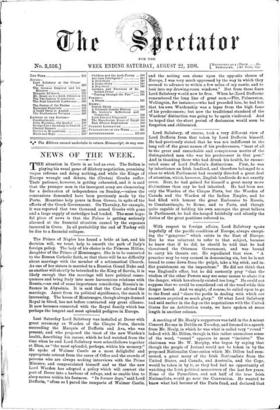Last Saturday Lord Salisbury was installed at Dover with great
ceremony as Warden of the Cinque Ports, therein succeeding the Marquis of Dufferin and Ava, who was present, and who proposed the toast of the new Warden's health, describing his career, which he had watched from the time when he and Lord Salisbury were schoolfellows together at Eton, as "the most splendid, perhaps, within his memory." He spoke of Walmer Castle as a most delightful and appropriate retreat from the cares of Office and the crowds of persons who are always seeking interviews with the Prime Minister, and congratulated himself and us that the new Lord Warden has adopted a policy which will convert the port of Dover into a harbour of refuge, and so enable him to sleep secure within his fastness. "In former days," said Lord Dufferin, "often as I paced the ramparts of Walmer Castle, and the setting sun shone upon the opposite shores of Europe, I was very much oppressed by the way in which they seemed to advance to within a few miles of my castle, and to look into my drawing-room windows." But from these fears Lord Salisbury would now be free. When he (Lord Dufferin) remembered the long line of great men,—Pitt, Palmerston, Wellington, for instance,—who had preceded him, he had felt that his own Wardenship was a lapse from the high fame of his predecessors ; but now the traditional standard of the Wardens' distinction was going to be again vindicated. And he hoped that the short period of declension would soon be forgotten and obliterated.


































